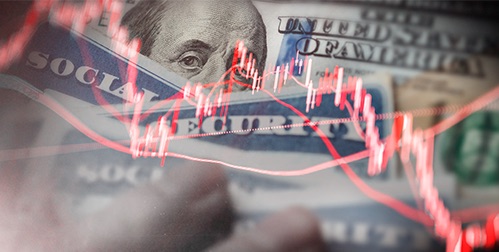- Natural disasters and their aftereffects inflict trillions of dollars of damage on the economy
- Beyond immediate physical damages, hurricanes result in unemployment, inflation, higher insurance, and market volatility
- The rising intensity and frequency of natural disasters heightens the need for protective financial strategies like a Gold IRA
Hurricanes Devastate Savings
Hurricanes are among the most destructive natural disasters, leaving a trail of devastation – both physical and financial. Their damage wreaks havoc not only on the afflicted area, but on the national economy. As we face a growing number of extreme weather events, such as Hurricane Milton and Helene, understanding their economic impact has become essential to protecting one’s financial future.
A Growing Danger
Hurricanes and tropical storms have accounted for over 50% of the $1.79 trillion in damages from billion-dollar weather disasters since 1980.1
2022 – Climate disasters cause almost $30 billion in losses2
2023 – Americans experienced 114 declared disasters3
2024 – $181.7 billion in GDP losses predicted if three major hurricanes make landfall4
.
 5
5
Local Economic Damage
The economic damage caused by hurricanes is vast and multifaceted. Direct costs from the storms include the immediate destruction of homes, infrastructure, and businesses. Hurricane Katrina caused over $200 billion in losses. Those losses include not only physical damage but also the broader financial aftershocks.
Joel Myers, AccuWeather’s founder and executive chairman, stated Milton is poised to become “one of the country’s most damaging and costly hurricanes.” Early estimates suggest economic losses could exceed $200 billion. That figure accounts for property damage, business closures, and significant infrastructure failures. All of which will have long-term consequences for the region.6
Hurricanes can result in mass unemployment. Following a major storm, many businesses are unable to reopen for days, weeks, or even months. Following Hurricane Katrina, for instance, over 230,000 individuals lost their jobs within ten months of the storm. This resulted in nearly $3 billion in lost wages. Helene could cause the loss of more than 100,000 jobs. 7
The repair and rebuilding efforts can stimulate economic activity. However, the net economic impact is still negative due to the massive losses and disruptions. In areas affected by back-to-back hurricanes like Milton and Helene, these losses are compounded. A prolonged period of economic stagnation can emerge.
Additionally, hurricanes disrupt key industries like agriculture and energy production. When Hurricane Ian hit Florida in 2022, the state’s citrus industry saw losses between $400 million and $700 million. 8
Similarly, the energy sector is vulnerable. Storms often force oil rigs and refineries to shut down temporarily. Chevron, for example, evacuated personnel at several Gulf of Mexico oil rigs in anticipation of Hurricane Milton. Potentially driving up energy costs nationwide.
National Impact
The economic impact of hurricanes often reverberates throughout the country. Hurricanes can negatively affect Gross Domestic Product (GDP). Particularly when they hit heavily populated or economically important regions. In 2005, the trio of storms—Katrina, Rita, and Wilma—lowered national GDP growth.
If Hurricane Milton’s damage exceeds $200 billion, the impact on third-quarter GDP could be significant. This is especially concerning because the storm comes right after Hurricane Helene. Helene has already affected states that contribute nearly 13% of the U.S. GDP.9

Increased Debt Burden
The cost of rebuilding after a hurricane is another financial burden that can last for years. Rebuilding infrastructure, homes, and businesses requires massive investments that can drive up public debt and insurance premiums.
Disaster relief is often classified as “emergency” spending. Therefore, it can circumvent normal budget caps and add directly to the national debt. It is rarely offset by cuts elsewhere in the budget. Between 2012 and 2021, Congress spent more than $400 billion outside discretionary spending caps on emergency relief. And this cost is projected to increase due to changing climate conditions. Relief further burdens the $35 trillion national debt. And in turn, threatens higher taxes and cuts to Social Security and Medicare. 10
Insurance Costs
The cost of insurance in disaster-prone areas is skyrocketing. Premiums have risen by over 30% since 2020, with storm-prone areas seeing hikes up to 50% or more. Some major insurance companies have even stopped issuing new policies in hurricane-prone states like Florida.11
Increased Retiree Risks
For retirees, the financial risks of hurricanes can be particularly devastating. Many retirees move to states like Florida, Texas, and North Carolina. The very same areas that are in the path of hurricanes. Beyond the potential for property damage, hurricanes disrupt local economies, leading to rising costs for essentials like food, utilities, and insurance. These price hikes, combined with market volatility during and after a storm, can erode retirement savings. Additionally, if retirees need to tap into their savings earlier than planned to cover emergency expenses, they may face tax penalties and fees, further depleting their funds.
Conclusion
As hurricanes become more frequent and severe, understanding their economic impact is crucial. From massive property damage to lost jobs and ruined businesses, the financial toll of hurricanes is far-reaching. For those nearing or in retirement, the risks are even greater. In the aftermath of a natural disaster, when markets are volatile and inflation risks increase, holding a portion of your savings in physical gold can offer peace of mind and financial security. A Gold IRA can provide long term savings protection against the increasing number of disasters. Contact us today at 800-462-0071 to learn more.






 5
5




 3
3


